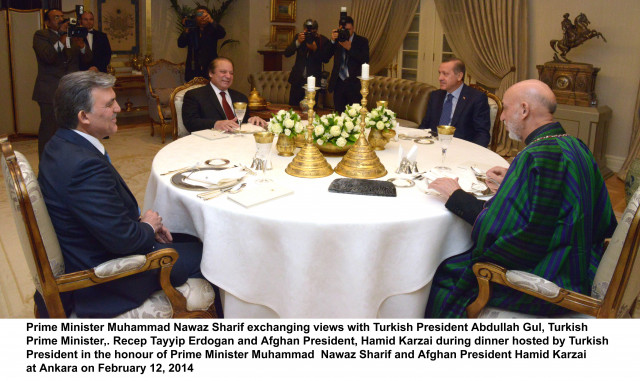Trilateral summit: old pledges, new times
Not only does Turkey have interest in seeing the two clear the air but can also facilitate push for regional stability

Prime Minister Nawaz Sharif, Turkish prime minister Racep Tayyip Erdogan and Afghan President Hamid Karzai along with Turkish president Abdullah Gul (unseen) during a dinner in Ankara on Wednesday. PHOTO: PID
This was the eighth trilateral summit between the three countries and though it may lack the lustre of a something new, it is often as significant to publicly ratify an old pledge on a major platform as it is to make new ones at times that are as critical as the one facing the region at the moment. In the case of Afghanistan and Pakistan, the renewing of the pledge to continue to cooperate with each other is an important reminder to all involved of the promises they have made as the region prepares to enter this phase. The Ankara-sponsored trilateral summit has always had its own significance compared with the one organised by Washington. The continued involvement of Turkey as the third wheel between what has been a dysfunctional relationship between Afghanistan and Pakistan is also key to ensure that the dialogue process is participated in by countries other than those involved in the conflict and machinations in Afghanistan — directly or indirectly. As a trusted and close partner of both countries, not only does Turkey have an interest in seeing the two clear the air but it can also facilitate the push for regional stability in a more objective manner while its mediation on hard issues will be more acceptable to both Islamabad and Kabul (as opposed, say, to mediation by the US, which both countries have a hard time trusting).
However, the involvement of Turkey can also be viewed as a lost opportunity to make meaningful and tangible advances in the bilateral relationship between Afghanistan and Pakistan. As mentioned earlier, Ankara enjoys considerable influence in both the countries and indeed commands its own respect on the international stage. Yet, it has, at least on the surface, not been able to push the two beyond a certain point and hold them to their agreements as a mutually-acceptable arbitrator. Take, for example, the resolve to deny sanctuary, training and financing to terrorists and to elements involved in subversive and anti-state activities and to initiate immediate action on specific intelligence exchanges in this regard. This pledge was made back in 2007 at the first summit. One cannot help but feel that Ankara could have used its influence to ensure that there was some sort of implementation to follow through. Yet, there seems to be none — particularly in the case of the safe havens on both sides of the border, which has been a sticking point for relations.
One case is particularly poignant. When asked about the operating of anti-Pakistan militants from the Afghan side of the border, President Hamid Karzai simply suggested that they were a product of Pakistan’s own mistakes. President Karzai has been less than moderate in his public statements on Pakistan over the last few years — and this has hardly helped matters. But such statements will be magnified even more given the important period that the region is entering. Perhaps, with the entry of a fresh face and with the beginning of such an important period, Ankara can finally step forward into a more assertive mediatory role. If nothing else, seven years of commitments can be used to compel all involved.
Published in The Express Tribune, February 16th, 2014.
Like Opinion & Editorial on Facebook, follow @ETOpEd on Twitter to receive all updates on all our daily pieces.














COMMENTS
Comments are moderated and generally will be posted if they are on-topic and not abusive.
For more information, please see our Comments FAQ